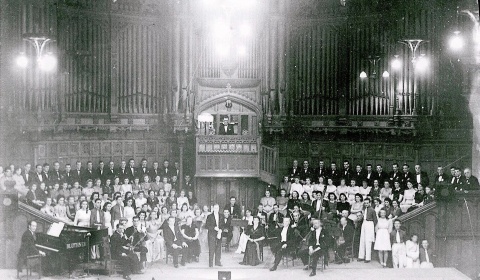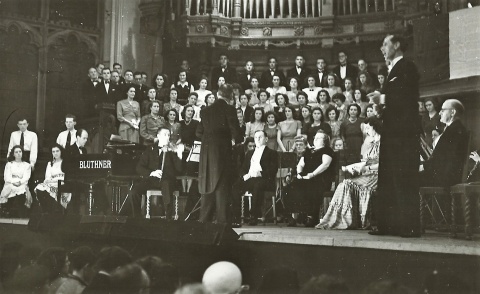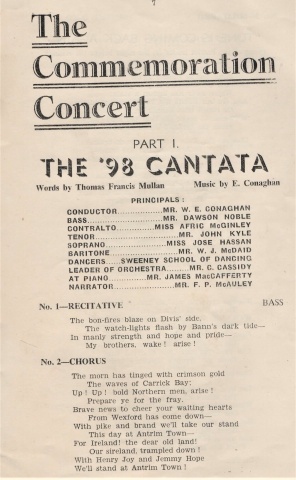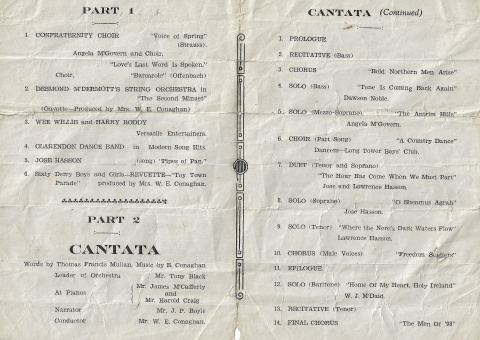It would be a mistake to assume that James’s career could be divided into tidy compartments. He was too much in demand to confine himself to one branch of music and, like many creative talents, he had many interests was always attracted to new challenges. So, we find him engaged concurrently in different projects throughout his career.
For example, while he was leading dance bands and accompanying and arranging for Jim Mc Cafferty’s ensemble he was still performing as a singer at local feiseanna and in musicals. In an interview with Frank Gallagher he spoke dismissively about his vocal abilities : “I sang as a bass, but I wasn’t worth a deuce - an enthusiastic amateur.” In fact, he possessed a fine voice and loved singing. He was also an able and intelligent interpreter of a song.
Besides the regular successes in competitions at the Derry Feis he was invited to take lead roles in various local operas and operettas. He took the part of the Vagabond King in the operetta of that name, principal parts in Les Cloches De Corneville, and Devil’s Hoof in The Bohemian Girl - a part which his mother, Cis, had played with great success some years before in an all-female production with Mrs O’ Doherty.
As Devil’s Hoof he was playing against Maureen Doherty and the production entailed carrying her off the stage at the end of the scene. This presented problems as James was slightly built whereas Maureen was in much healthier shape. The difficulty was finally resolved by fitting little castors to her heels so that he could simply wheel her off.
Every now and then he would have an opportunity to perform a different repertoire. One such occasion was the Conversazione which Charlie Gallagher organised for the evening of the 20th December 1942. (James and Charlie were lifelong friends from their school and scouting days.) Some of the foremost musicians were invited to participate for a select audience which included Redmond Friel and William Golden. Charlie had typed up a programme for the event which featured Lall Coyle who played piano pieces by Brahms and Beethoven. Dessie Mc Dermott played a Bach concerto for violins along with Tony Black and James, and he also sang various tenor solos. Don Mc Cafferty sang The Shropshire Lad among others and played the bass fiddle in some of the ensembles. Paddy Lynch played a couple of Kreisler compositions as part of his solo contributions. Charlie, a baritone, featured in the male quartet and individual pieces by Frank Lambert and Handel. James sang several arias from The Magic Flute, and Patrick Mc Ginley gave bass - baritone renditions of Where’er You Walk and The Lute Player. The programme was interspersed with ensemble pieces such as Tony and James’s performance of Friel’s Irish Fantasy.
In 1898 Edward Conaghan, the organist in St. Columb’s Long Tower church had composed a work to commemorate the 1798 rising for which Thomas Mullan had written the libretto. James’s father, Pat, had sung in the first performance and the music always had a special place in James’s heart. It was decided to resurrect the Cantata in 1944 on the 13th and 14th of December. It boasted a chorus of 120 voices. The evening was divided into a concert in the first half which consisted of comedy routines with Wee Willie and Harry Roddy, The Clarendon Dance Band, The confraternity Choir, and Dessie Mc Dermott’s String Orchestra which consisted of 60 children. The second half featured The Cantata with its prologue, recitative and rousing choruses such as Bold Northern Men Arise, touching duets such as The Hour Has Come, A Country Dance and love songs like O Seamus Agrah. It was performed again in 45 and Pat sang in the chorus once more. and was one of the only two from the original performance. Sadly by the time the 150th came around in 1948 he was dead.
These productions took place in the guildhall and involved solo performers and a substantial chorus. There were dancers and an orchestral group comprising strings, woodwind, percussion, grand piano, and the guildhall organ. Frank Mc Cauley was the narrator. Others taking part included Dawson Noble, Angela Mc Govern, Larry and Josie Hasson and Willie John Mc Daid.. Harold Craig was the pianist. The performances were a sell - out. Others who participated in these presentations were Afric Mc Ginley and John “Petey” Kyle as soloists and Nelly Sweeney’s dancers.
Harold Craig was replaced by James for the 44 and 48 shows but the organiser, Fr. Jim Monagle, was reluctant to engage him as the official pianist and expressed reservations about whether a dance band musician would be able to cope with more demanding music. He needn’t have worried - James sight - read the entire score and provided a flawless accompaniment for the singers.




